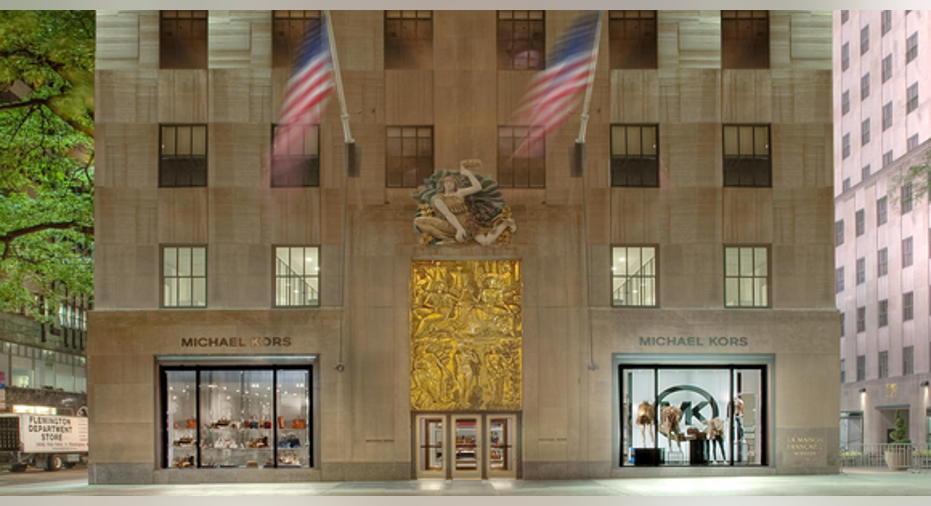Kors Deals With a Big Drop in Comp Sales

Image source: Michael Kors.
Luxury retailer Michael Kors Holdings (NYSE: KORS) has been dealing with the ups and downs of the fashion industry during the past couple of years, and investors have looked longingly for any signs that the company's turnaround efforts have started to pay off. Coming into Wednesday's fiscal first-quarter financial report, Kors investors were prepared to see further declines in sales and earnings as the company continued to struggle against an adverse environment in the retail industry overall.
Kors' results weren't as bad as many expected, but a substantial decline in comparable-store sales had many shareholders worrying if the company is on the right track. Let's take a closer look at Michael Kors to see if its latest earnings report is something to get excited about, or should provoke further concern.
A mixed story from Kors
Michael Kors' fiscal first-quarter results gave investors a mixed picture of the company's current financial condition. Revenue inched up 0.2%, to $987.9 million. Although that pace was slower than last quarter's rise, it was still far better than the 3% top-line decline that most investors were expecting.
Adjusted net income dropped by almost 11%, to $156 million, and that produced adjusted earnings of $0.88 per share. That was actually up slightly on a per-share basis, and it topped the consensus forecast among those following the stock by nearly 20%.
Looking more closely at Kors' results, there were some reasons for concern, despite the better-than-expected top-line and bottom-line figures. Comparable-store sales plunged 7.4%, erasing last quarter's slight upward movement in comps. Retail net sales were up almost 8%, due largely to the increase in store counts stemming from Kors' corporate moves related to its operations in the greater China region, South Korea, and Latin America.
Wholesale net sales fell 7%, and licensing revenue plunged by more than a fifth. Currency impacts have nearly disappeared from Kors' results, costing it just a fifth of a percentage point on the revenue front.
Kors' trend of posting stronger results outside of its home territory continued during the fiscal first quarter. Revenue from Kors' Americas region fell 5%. However, revenue from Europe rose by more than 3%, and Asia-related sales soared by three-quarters, due mostly to acquisition activity.
CEO John Idol gave a mixed picture of Kors' success. "We delivered another quarter of strong growth in our North American digital flagships," Idol said, "further expanded our presence globally, particularly in Asia, and expanded our fashion product offerings." However, the CEO pointed out that "this progress was muted by the continued decline in mall traffic trends, as well as a decrease in tourism in certain major cities, which negatively impacted our comparable-sales performance during the quarter."
What's next for Kors?
Kors expects that it will continue to focus on its long-term growth strategies. Idol pointed to new digital flagships in Europe, as well as efforts to bolster its appeal to male customers. Several retailers have worked hard to get more men into their stores, and expanded product offerings could help in Kors' attempts on that front. In particular, the debut of the Access line of smartwatches and trackers could well appeal to a broader audience.
Once again, however, Kors' outlook tried to set the bar low for future financial performance. For the fiscal second quarter, Kors says it expects sales of $1.07 billion to $1.085 billion, which is less than the $1.11 billion that most investors had expected. In particular, international expansion and digital efforts will produce a dramatic increase of around 8 percentage points in operating expense as a percentage of sales, and the pressure on operating margin will translate to earnings of just $0.84 to $0.88 per share for the quarter. That's far less than the $1.13 per-share consensus forecast.
In the longer term, however, Kors' guidance wasn't quite as downbeat. Adjusted earnings of $4.56 to $4.64 per share for the full fiscal year is in line with what investors expected to see, although a mid-single-digit percentage drop in comparable-store sales shows that Kors has further to go before it will return to a growth trajectory once and for all.
Kors shareholders chose to focus on the negatives in the report, sending the stock down almost 4% in pre-market trading following the announcement. Although investors have been patient, the tough environment in luxury retail promises to challenge Kors well into the new fiscal year, and push any full turnaround even further into the future.
A secret billion-dollar stock opportunity The world's biggest tech company forgot to show you something, but a few Wall Street analysts and the Fool didn't miss a beat: There's a small company that's powering their brand-new gadgets and the coming revolution in technology. And we think its stock price has nearly unlimited room to run for early in-the-know investors! To be one of them, just click here.
Dan Caplinger has no position in any stocks mentioned. The Motley Fool owns shares of Michael Kors Holdings. Try any of our Foolish newsletter services free for 30 days. We Fools may not all hold the same opinions, but we all believe that considering a diverse range of insights makes us better investors. The Motley Fool has a disclosure policy.



















